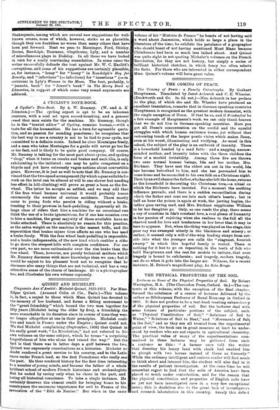QUINET AND MICHELET.
Cinguante Ans d'Amitie r: Michelet-Quinet, 1825-1375. Par Mme Edgar Quinet. (Armand Colin et Cie., Paris.)—This volume is, in fact, a sequel to those which Mme. Quinet has devoted to the memory of her husband, and forms a fitting monument to the "great friendship" which bound the two men together for fifty years (Michelet being the elder by five), a friendship the more remarkable in its duration since in course of time they were no longer altogether at one in their principles. Michelet coulo live and teach in France under the Empire ; Quinet could not. We find Michelet complaining (September, 1868) that Quinet in his really great work, "La R6volution," had not referred to his own volumes on the same subject, which he terms "a surprising forgetfulness of him who alone had traced the way." But the fact is that there was in latter days a gulf between the two. Quinet was supremely conscientious as a historian. 3lichelet no doubt rendered a great service to his country, and to the Latin races under French lead, as the first Frenchman who really saw the past. He thus rendered history for the first time interesting to a number of young minds, and became the father of a whole brilliant school of modern French historians and archteologists But he ended by seeing only what he chose in the past, and losing all historical conscience. To take a single instance. He certairdy'deserves the utmost credit for bringing home to his countrymen the enormous importance for evil to France of the revocation of the "Edit de Nantes." But when in the same
volume of his " Histoire de France "he boasts of not having said a word about Jansenism, which holds so large a place in the literature of the time, he exhibits the petulance of a geographer who should boast of not having mentioned Mont Blanc because Chimborazo had been so much less talked about. And Quinet was quite right in not quoting 3lichelet's volumes on the French Revolution, for they are not history, but simply a series of brilliant historical sketches, in which fancy too often selects the facts. For those who are interested in either correspondent fame. Quinet's volume will have great value.


















































 Previous page
Previous page